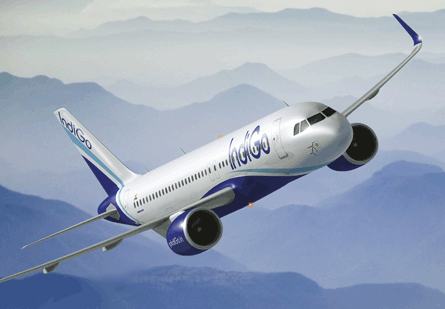In choosing the name of its A320neo, Airbus sought to head off any suggestion that the variant wasn't quite new enough. Many in the industry had agitated for a clean-sheet design offering a leap forward in efficiency. Instead, Airbus opted for a solution that could present more incremental benefits in a nearer term.
News that IndiGo had become the first airline to endorse the A320neo, by committing to an improbably huge number of the aircraft - 150 - within a wider Airbus deal, carried a hint of déja vu. IndiGo was a mere paper airline when, at the Paris air show in 2005, it signed for 100 A320s and much head-scratching ensued - not to mention some scoffing. But the Indian budget carrier proceeded to launch in 2006 and today has 34 Airbus narrowbodies in operation, with another 61 on order. IndiGo is no fly-by-night and, what's more, in the half-decade since it first revealed grand plans, the balance of economic power has shifted decisively.
 |
|---|
© Tim Bicheno-Brown/Flightglobal |
By today's consensus, India is the powerhouse of the future. China is of course similarly fast-growing and populous, but accessing its markets is problematic for outsiders, largely for political reasons. Corruption and bureaucracy may bedevil India, but the economy runs along familiar lines - and everyone wants a piece of the action. Airbus's decision to go public with IndiGo's tentative A320neo order must be seen in this context.
Tradition, of course, dictates that established major airlines' endorsements are most critical to a newly launched type's prospects. But to raise an eyebrow at the spurning of that logic is perhaps to misunderstand Airbus's intentions. Although it resisted pressure to pursue an all-new airliner, the manufacturer is plainly hopeful that the A320neo represents a new dawn for its business. How better to trumpet that than by securing a relative newcomer to an exponentially growing market as the pacesetter for its sales campaign?
Certainly, loud and clear messages have been broadcast to Montreal and Seattle. For Bombardier, there is the suggestion that new markets do not necessarily favour new market entrants like the CSeries. This is not year zero, and India's rise needn't turn the airframe manufacturing axis on its head. To Boeing, Airbus's new-year sally warns of the perils of procrastination. While the US airframer continues to ponder the case for re-engining, its chief rival not only has a confirmed product strategy but a weighty endorsement from an airline that might just represent the future. How many more deals might be struck if it remains in stall?
Source: Flight International


























